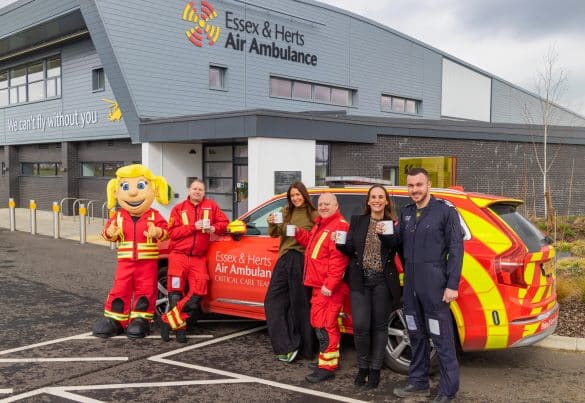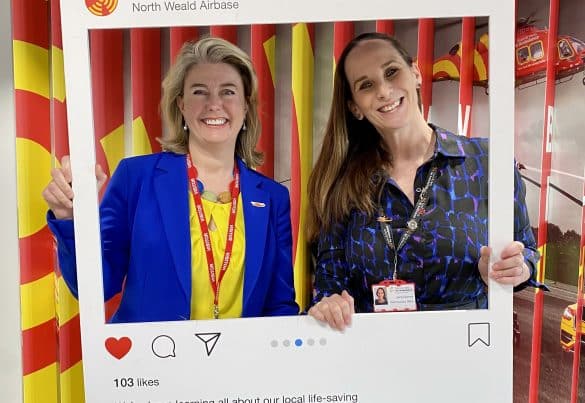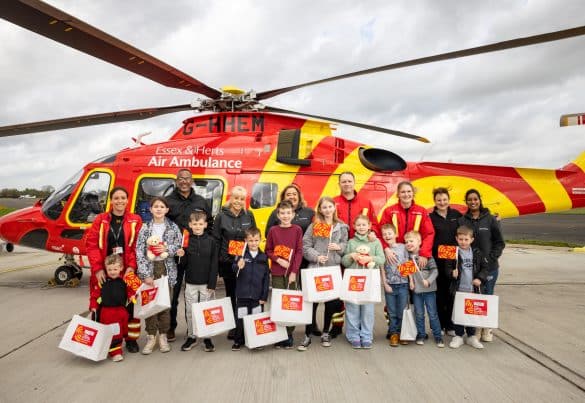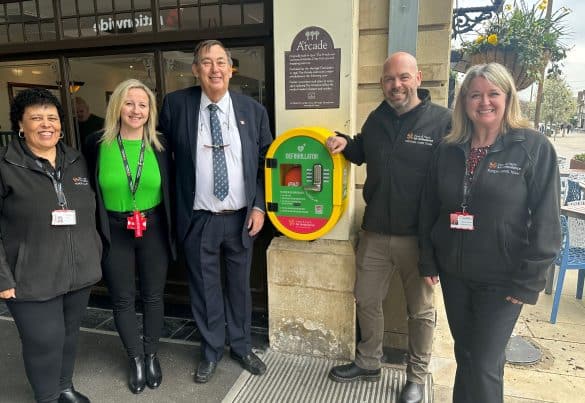Essex & Herts Air Ambulance to join national blood trial
SHARE
Over the coming months, Essex & Herts Air Ambulance will be joining with other air ambulances across the country to begin a new clinical trial where their crews will carry ‘whole blood’, instead of separate red blood cells and plasma.
Led by NHS Blood and Transplant, in partnership with the Ministry of Defence and Air Ambulances UK, the SWIFT(1) trial will involve air ambulance charities transfusing ‘whole blood’ to treat severely injured patients, potentially improving civilian and military trauma care. If the trial shows patient benefit, it could reduce trauma deaths in civilian accidents and also on the battlefield, and in any situation where delaying a transfusion by seconds or minutes could be critical.
Essex & Herts Air Ambulances has carried red blood cells since March 2019. However during the SWIFT trial they will also carry ‘whole blood’. This is blood as it taken from the arm of a donor. It includes all the different blood components together, such as red blood cells, plasma, and platelets(2). Previous studies, including on military casualties in Afghanistan, have indicated whole blood could have better outcomes for trauma patients, including a greater chance of survival.
Whole blood may work better because it contains platelets. Platelets are the cell fragments which help the blood to clot. Platelets are difficult to store – they have a short five-day shelf life, must be stored between 20C and 24C, and need constant gentle movement to help them stay oxygenated – so they are very difficult to use outside of hospitals. Currently, air ambulance patients, and soldiers needing battlefield transfusions, can receive plasma and red blood cells – but not platelets.
Additionally, carrying and transfusing one blood product could also be lighter and simpler. It could enable faster treatment, at a time when every minute counts. And it could make the transfusion process easier and reduce risk, a crucial benefit in difficult and fast-moving incidents.
There is already past evidence that whole blood could lead to reduced mortality and reduce the amount of blood needed after patients arrive at hospital(3). However only a full randomised controlled trial such as SWIFT can provide the definitive answers.
All of the blood used will come from group O Rh negative donors. This is the ‘universal donor’ blood type, which is vital in emergency trauma care, when there is not time to check the patient’s blood type before transfusion is started.
Over a two-year period, SWIFT will recruit 848 patients. One group of patients will continue to be given transfusions of red blood cells and plasma separately, with platelets given if needed after arrival at hospital. The other group of patients will receive transfusions of whole blood. The trial will compare survival and the amount of blood needed over the first 24 hours after injury.
Further improving trauma care would be of major importance. Major trauma kills more than 5,400 people every year in the UK. Pre-hospital red blood cell transfusions already save lives, with studies in military and civilian settings reporting a 12-14% absolute reduction in 30-day mortality(4). This trial could enable a further reduction in mortality.
Simmy Akhtar, Air Ambulances UK CEO said “We’re proud to support the SWIFT trial in collaboration with NHS Blood and Transplant and the Defence Medical Services. A number of air ambulance charities across the UK are directly involved with this trial and like them our vision aligns with the SWIFT trial, that together we will ensure the best possible chance of survival and patient outcome for everyone in need of lifesaving pre-hospital care. Air ambulance crews are continually striving to provide the highest level of patient care and we hope the results will ultimately improve trauma care.”
The full list of air ambulance charities who are taking part in SWIFT is:
Air Ambulance Kent Surrey Sussex
Dorset and Somerset Air Ambulance
Essex and Herts Air Ambulance
Great North Air Ambulance
Great Western Air Ambulance
Hampshire and Isle of Wight Air Ambulance
London’s Air Ambulance
Magpas Air Ambulance
North West Air Ambulance
Thames Valley Air Ambulance
Funding for the trial has been provided by NHSBT, the air ambulance charities, and the Ministry of Defence. The trial went live on December 14th with the London Air Ambulance only. It is being rolled out over the next few months to other air ambulance services across the country.
Notes
(1) SWIFT stands for Study of Whole blood In Frontline Trauma.
(2) Red blood cells carry oxygen around the body. Plasma is the liquid part of your blood and it contains proteins which help blood to clot. Platelets are cell fragments that are essential for blood clot formation.
(3) Spinella, P.C., et al. Warm fresh whole blood is independently associated with improved survival for patients with combat-related traumatic injuries. s.l. : J Trauma, 2009. Cotton, B.A., et al. A randomized controlled pilot trial of modified whole blood versus component therapy in severely injured patients requiring large volume transfusions. s.l. : Ann Surg, 2013. Yazer, M.H., et al. Initial safety and feasibility of cold-stored uncrossmatched whole blood transfusion in civilian trauma patients. s.l. : J Trauma Acute Care Surg, 2016. Perkins, J.G., et al. Comparison of platelet transfusion as fresh whole blood versus apheresis platelets for massively transfused combat trauma patients (CME). s.l. : Transfusion, 2011.
(4) Major Trauma Care in England: report by the Controller and Auditor General. s.l. : National Audit Office, 2010. Shackelford, S.A., et al. Association of prehospital Blood Product Transfusion During Medical Evacuation of Combat Casualties in Afghanistan With Acute and 30-Day Survival. s.l. : JAMA, 2017. Griggs, J.E., et al. Mortality of civilian patients with suspected traumatic haemorrhage receiving pre-hospital transfusion of packed red blood cells compared to pre-hospital crystalloid. s.l. : Sc and J Trauma Resusc Emergency Med, 2018.
Join our mailing list
Join the community and recieve all the latest news and updates straight to your inbox.






